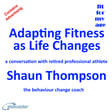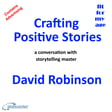
Understanding ADHD - a conversation with ADHD Coach Laurence Pratt
Laurence Pratt is a business coach who works with entrepreneurs and small businesses.
Laurence is also a specialist coach for people with ADHD. He helps people to work with their ADHD to become the best version of themselves and achieve their personal career ambitions.
In this episode of the Abeceder podcast Fit For My Age Laurence explains to host Michael Millward what ADHD is and how an ADHD brain functions differently to a neuro typical brain the relationship between the gut and the brain to host Michael Millward.
Michael and Laurence discuss what colleagues of people with ADHD can do to make the lives of an ADHD colleague and their own working day easier.
They also discuss what an employer can do to make employing someone with ADHD easier for them and the person with ADHD.
Audience Offers
Proactive Positive Ageing.
It is always a good idea to know the risks early so that you can take appropriate actions to maintain good health, that is why we recommend The Annual Health Test from York Test.
York Test provides an Annual Health Test. An experienced phlebotomist will complete a full blood draw at your home or workplace. Hospital standard tests covering 39 different health markers are carried out in a UKAS-accredited and CQC-compliant laboratory.
A Personal Wellness Hub gives access your easy-to-understand results and guidance to help you make effective lifestyle changes anytime via your secure, personal Wellness Hub account.
Visit York Test and use this discount code AGE25.
Fit For My Age is made on Zencastr, because Zencastr is the all-in-one podcasting platform, that really does make creating content so easy.
If you would like to try podcasting using Zencastr visit zencastr.com/pricing and use our offer code ABECEDER.
Travel Members of the Ultimate Travel Club enjoy travelling at trade prices on flights, trains, hotels, holidays and so many other travel related purchases. Use the link to access discounted membership.
Find out more about both Michael Millward and Laurence Pratt at Abeceder.co.uk.
Matchmaker.fm If you are a podcaster looking for interesting guests or if like Laurence, you have something interesting to say Matchmaker.fm is where great hosts and great guests are matched and great podcasts are hatched. Use our offer code MILW10 for a discount on membership.
Being a Guest
If you would like to be a guest on Fit For My Age, please contact using the link at Abeceder.co.uk.
We recommend the podcasting guest training programmes available from Work Place Learning Centre.
We appreciate every like, download, and subscriber.
Thank you for listening.



















